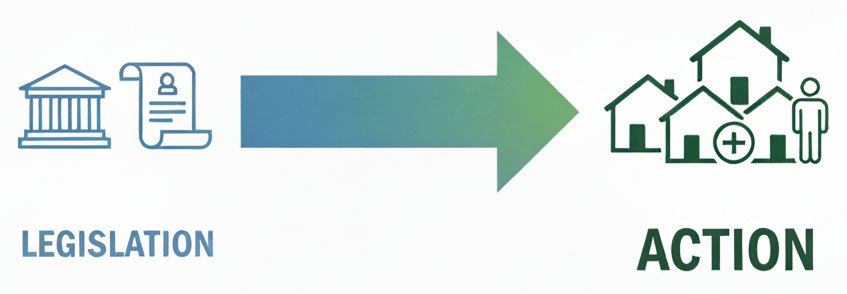Policy update
Ask and Act Duties: What Scotland’s New Housing Bill Means for Services
Scotland’s new Housing Bill puts prevention front and centre. Here’s how Ask and Act duties will reshape daily practice across public services—and how Ask:Enact can help teams respond with confidence.

The Scottish Government is reshaping how we deal with housing insecurity. A central feature of the new Housing (Scotland) Bill is the introduction of “Ask and Act” duties. These duties will require public services to ask about people’s housing situations and then act if there are risks to their housing security.
This is a shift from reacting once someone has lost their home to preventing homelessness before it happens. For councils, health boards, social landlords, social work, and the third sector, it brings new responsibilities — but also new opportunities. Here’s what it means and how tools like Ask:Enact can help.
What Are “Ask and Act” Duties?
What the Bill Actually Says
The Housing (Scotland) Bill (Stage 2) states:
“A relevant body must ask an individual whether they are homeless or threatened with homelessness, and where that is the case, must take such action in the exercise of their functions as they consider appropriate to remove or minimise the threat of homelessness.”
What That Means in Practice
- The legal language focuses on homelessness and the threat of homelessness.
- In practice, this is about asking about housing situations in a way that can identify risks early. It doesn’t mean bluntly asking every person “Are you homeless?”.
- Acting then means taking steps within the service’s role — such as a landlord agreeing a repayment plan, or a health worker linking a patient to support.
- If the risk can’t be resolved within that service’s remit, the next step is to refer the person to the council or another partner.
So, a health worker might connect a patient with a housing advice service; a landlord might help a tenant in arrears; social work might connect with a financial inclusion team. The duty is clear: do what you reasonably can, then refer if necessary.
Who Will Have to Comply?
The Bill defines a list of “relevant bodies” in Scotland. These include:
- NHS Health Boards and Special Health Boards, plus Integration Joint Boards.
- Local authorities — not just housing, but all departments that interact with people at risk.
- Social work services — including justice, adult, and children & families social work.
- Justice services — Police Scotland and the Scottish Prison Service.
- Social landlords — registered social landlords (RSLs) and local authority landlords.
- Social Security Scotland — expected to be added, recognising how benefits link to housing risk.
Third-sector organisations, charities, and advice bodies are not legally bound but will be vital delivery partners. Many referrals will naturally flow to them, so they will sit at the heart of the new system.
Why This Matters
Until now, councils have carried most of the legal duty, and action often began only once someone was already homeless. That meant missed opportunities and inconsistent prevention.
Ask and Act builds on recommendations from the Prevention Review Group, which called for a cultural shift: treat housing stability as everyone’s responsibility.
Other changes in the Bill reinforce this, including:
- Extending the definition of “threatened with homelessness” from 2 months to 6 months.
- Requiring social landlords to have policies to support tenants experiencing domestic abuse.
- Removing outdated concepts like “intentionality”, which sometimes blocked early help.
Taken together, these measures are about spotting problems earlier and tackling them before they escalate.
What Will Change in Practice?
Local Authorities
Councils will receive more early referrals from partners. Housing teams will need systems to handle upstream cases, not just crisis applications. Other departments — from social work to customer service hubs — will have to treat housing risk as part of their normal responsibilities.
Health Services
NHS staff will ask about housing in everyday interactions. If a patient discloses risk, the service should take action within its role — for example, linking to a hospital housing worker, or providing information on grants and repairs. The goal is to make housing a routine part of holistic healthcare.
Social Work and Prisons
Social work will need to ensure housing stability is part of all casework — from children & families support, to adult services, to justice social work. The Scottish Prison Service must also prevent people leaving custody without secure housing, working closely with local councils and third-sector partners.
Social Landlords
RSLs and council landlords will have a duty of inquiry: to ask tenants about housing stability and act where risks appear. While landlords already follow legal safeguards before eviction, the new duty goes further — requiring proactive support to help sustain tenancies. This could mean repayment plans, debt advice referrals, or safety planning for tenants experiencing abuse.
Social Security Scotland
Benefits staff will likely incorporate housing questions into their processes. If someone’s income crisis is putting their tenancy at risk, the agency can connect them to local housing help.
Opportunities for Services
These duties shouldn’t be seen purely as extra work. They bring real opportunities:
- Better outcomes — fewer families in temporary accommodation, improved health, and greater stability.
- Shared responsibility — every agency plays a role within its remit, so no single service carries the full burden.
- Stronger partnerships — pilots are already building new models of collaboration between councils, health boards, and the third sector.
- Innovation — new roles, referral systems, and training approaches will emerge.
- Efficiency — preventing homelessness saves money compared with crisis response.
Challenges to Prepare For
- Training and confidence — staff need clear, simple guidance on what to ask and what to do.
- Workload — more people may come forward with hidden housing problems; pilots will help map demand.
- Data sharing — secure, lawful protocols are essential to protect privacy and enable referrals.
- Consistency — agencies must avoid simply “signposting and forgetting”; actions must be real and proportionate.
These challenges are significant but manageable, especially with the government funding pilots and developing national guidance.
How Ask:Enact Can Help (shameless plug)
Delivering Ask and Act is as much about practical support as policy. That’s where Ask:Enact comes in.
- Conversational support — professionals use a simple, chat-style interface to describe a situation. The system then asks relevant follow-up questions in plain language and provides clear, policy-aligned guidance.
- Filling knowledge gaps — it helps staff who aren’t housing experts understand the risks and respond confidently, without needing to memorise legislation or undergo constant retraining.
- Prioritisation of risk — the tool highlights urgent issues (like immediate safety) first, then works through other needs step by step.
- Multilingual access — removing barriers for professionals and communities where English isn’t the first language.
- Consistency and auditability — responses are accurate, unbiased, and consistent across services, with usage logged and analysed so organisations can learn from the daily interactions and genuine concerns of the people with the living experience.
- Future development — referrals to services are on the roadmap, but in this first phase the emphasis is on equipping professionals with the words and confidence to ask about housing, recognise risks, and act within their role.
Put simply: Ask:Enact is like having that one colleague who always knows the answer — giving frontline staff the words, knowledge, and confidence to meet the new duties.
Conclusion
The new Ask and Act duties mark a turning point in Scotland’s housing system. By requiring a wide range of services to take housing risk seriously, the Bill aims to stop homelessness before it starts.
For local authorities, health boards, social work, social landlords, and the third sector, this is a chance to work differently and achieve better results for the people they serve.
Change always brings challenges, but with the right preparation and tools, Ask and Act can move Scotland closer to a future where homelessness is prevented rather than reacted to.
At Ask:Enact, we’re here to support that transition — making sure services can meet their new duties with confidence, clarity, and compassion.
